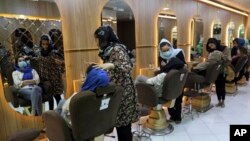Afghan women owning and working at beauty salons gathered in Kabul over a two-day period this week to protest a recent decision by the Taliban to shut down their businesses.
Saying the move will force their women-led households into poverty, the protesters appealed to Taliban leader Hibatullah Akhundzada, who reportedly resides in the southern Kandahar province, shuns appearing in public and does not meet women.
Akhundzada's decree to close all women's beauty parlors within a month marks the latest in a long list of discriminatory policies imposed by his so-called Islamic Emirate, which has earned Afghanistan the notorious title of "gender-apartheid regime" from the United Nations and human rights groups.
"They closed universities, schools, education and jobs, and now they're closing this avenue for women too. I don't know what the leaders of the Islamic Emirate want from us," one woman told TOLOnews, a local TV channel.
"Two households with disabled children depend on my job," said another woman.
Despite the pleas from the protesting women, the decision to shut the salons will be implemented in due course, said Mohammad Sadiq Akif, a spokesperson for the Taliban's Sharia enforcement ministry, which issued the controversial order.
"We have given both economic and Islamic reasons already," Akif told VOA.
The Taliban say the salons add unnecessary and excessive costs on men during their wedding ceremonies when brides are taken to these establishments.
"They also implant hair and pluck eyebrows, which are against the Sharia," Akif said in a video message.
The protesting women, however, say their salons strictly adhere to personal hygiene and cosmetic services without engaging in any un-Islamic practices.
Human rights groups have strongly condemned the Taliban's order on the closure of the beauty salons and accused the Islamist regime of trying to erase women from all public spheres.
Taliban leaders say their decisions are based on Afghan culture and Islamic values.
Teacher training discontinued
Amid a universally condemned ban on girls' secondary education since the Islamist group seized power in 2021, Taliban authorities this week announced the dissolution of Afghanistan's teacher training institute.
The institute employed nearly 4,000 people, many of them women.
In a statement, the Taliban's education ministry labeled the institute "ineffective and unnecessary" and said, "The fate of all of its employees will be decided" in the near future.
About 80% of school-age girls, or more than 2.5 million, and more than 100,000 female university students are banned from education in Afghanistan, according to the United Nations.





